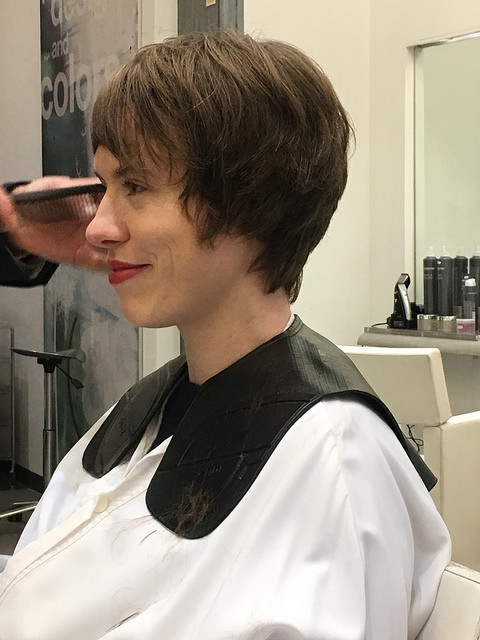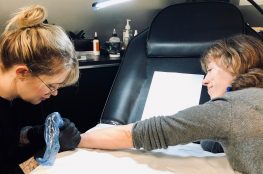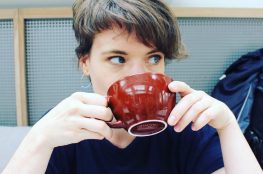As mentioned in my previous post, this will be the last one in my brain surgery and recovery blog post series. Specifically, this is about confidence after a brain surgery and getting strong and healthy again.
Confidence after brain surgery
Right after surgery, I wasn’t really up for looking at myself in the mirror, partly because I didn’t want to face Frankenstein impersonated by yours truly, but also, because I was afraid I wouldn’t recognise myself. When I finally did look at myself, I did see me, but I also didn’t see me.
I often asked myself “who is this person?” and didn’t feel like I was in my own body that I had known for 30 years. To be honest, I still sometimes don’t recognise the person in the mirror looking back at me. It still feels strange and that is OK! I found it best to accept and not dwell.
Medication does stuff to you
Medication, specifically steroids, don’t help on the self-confidence front. It changes your body from one day to the next. At least, that is the sensation because you’re bed-ridden and don’t feel much at all other than diminishing muscles (hello butt, where did you go?), exhaustiveness and shooting pains in your head. So when you do get up and notice all the changes that have happened over a month or so, it is rather odd to have to acquaint yourself again with yourself.
I often compared myself to a floating Michelin man. Don’t do that to yourself! Be kind. You just had major invasive surgery and pumped full of steroids for your hormones to function properly!
Hair, hair, hair

A major turning point for me was getting my hair cut. My hair was limp, my forehead extra large and generally I didn’t know what to do with it. I am extremely lucky to have found a hairdresser who has experience with people having had brain surgery, who knows a thing or two about face shapes, hair and character and who doesn’t follow trends (thanks mum!). I know this sounds vain, but it did a lot for me feeling like me again.
Accepting the post-surgery me
I struggled. If you, reading this, are going through something similar, it is likely you will too. But, as I said already, it is OK. On the outside, you don’t look that different and it helps having close people around you who validate this. Obviously, external validation will only take you so far, but in this instance, I think it is very important to let those outside voices in to mute the inside voices.
It sounds really simple, yet so tricky to do. I think for me it eventually just clicked. I stopped thinking about my body, hair and face, went out and about without covering anything up and realised that no one, not one person on the street, restaurant or at a leaving do (hey Esra!) suspected anything. No questions or comments about my stubbly hair peaking through. So no questions or comments about my surgery.
That is not to say that on the inside everything was dandy. This whole surgery thing launched an avalanche of internal reflections for me and I am still going through it. It depends entirely on the person, but I chose to accept that this could (and did) happen and I am happy and more confident for it. It is tough work, like anything that has to do with oneself and change, but I feel more like me now, than I have before. It’s a bit of a f*** it!, who cares? and if not now, then when? mentality that is so, so healthy.
Getting strong and healthy after brain surgery
In previous posts, I mentioned my mum and husband reigning in the “unhealthy” food categories that my steroid induced self would have devoured every two hours. Besides that, before surgery I trained a decent amount to not loose too much of my fitness and to be quicker building it back up after surgery. Not sure if that actually worked, but I’d like to believe so.
About one month and a half/two months I started with gentle stretches and exercises here and there that didn’t require the downward dog position or heavy, blood-rush-to-the-head moves. And I mean gentle, like lying on your back, pillow under head and moving your legs up and down about 5 times. Picking items up in squat position because you can’t bend over also helps; daily walks, even if it’s just around the block.
My stamina, naturally, was shot. The first time running (more like a fast walk-run) only lasted 2 minutes and I realised that I needed to take it even slower. I recommend fast walking for 5-10 minutes to begin with and build it up from there. Also, running and the bumping movement that comes with it…not a great feeling in the head.
To be fair, I also dealt with cortisol deficiency, which is not great when you want to get back on track. When that was sorted and I got a feel for how the hydrocortisone affected my body, my road to fitness went rather swimmingly.
Side note: my pituitary gland is recovering in that regard and I am producing my own cortisol again and only have to take small amounts in addition at the moment. This will hopefully soon be zero. Yay!
I started in January (about 3 months after surgery) with yoga, a bit of bouldering and some low-impact HIIT workouts. Then, I got a few personal training sessions for my birthday to help me get back on track. Now, I feel strong and healthy and dare I say semi-fit (I mean I did shovel earth for 3 days). I try to do something 5 times a week with a mix of cardio, strength and flexibility.
Anything I haven’t answered?
If you have read all of the posts in this mini-series and are left with unanswered questions or comments you’d like to share, feel free to post them below and I will do my best to answer them.
All the posts about my brain surgery are here.




10 July 2017
[…] How My Brain Surgery Affected My Confidence & Fitness […]
4 May 2022
Your surgery series helped me a lot when i got ready for my first surgery in 2019. I have never tried headstands though, even after two years. I assume I will have my second surgery becuse of regeneration of my menengioma:/ but this post motivated me again 🙂 thanks for documented all of these.
10 May 2022
I hope all will go well. I had my second one last year and it’s gone well. Crossing my fingers for you and wishing you all the best.